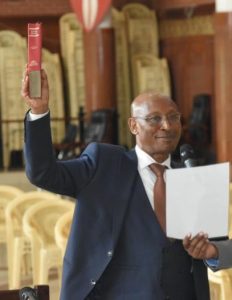Nairobi City Official’s Shocking Testimony Sparks Legal Drama Over Land Ownership Dispute


In an unexpected twist, the Nairobi City County government has been forced to distance itself from a controversial testimony provided by one of its top officials in an ongoing land dispute case.
Stephen Gathuita Mwangi, the county’s chief officer responsible for boroughs, administration, and personnel, had earlier submitted a witness statement in support of a company suing the county over the ownership of two commercial plots in Eastleigh Estate, Nairobi. However, the county now claims that Mwangi’s statement contradicts its official records, raising questions about his involvement in the matter.
The dispute centers around the ownership of two adjacent plots—L.R. 36/VII/1078 and 36/VII/1079—located in Eastleigh. The company suing the county, Lafey Trading Company Limited, insists that it is the rightful owner of the land, having been allocated the plots by the Nairobi City Council in the past. However, the Nairobi City County has rejected Mwangi’s witness statement, calling it “strange” and insisting that it was not aware of its contents. The county attorney went on to stress that Mwangi had not brought the statement to their attention beforehand.
In an official letter dated October 23, 2024, the county government expressed its concern over the statement and urged the court to disregard it. Instead, the county backed a statement by Geoffrey Cheruyiot, a key official in the Lands Department, who argued that if the land had been allocated to Lafey Trading Company, it would have been an irregular transaction, as the plots were under the control of the Commissioner of Lands, not the Nairobi City Council.
Adding another layer of complexity to the case, the first respondent, Abdi Dahir Ali, who claims to be the rightful owner of the two plots, asserts that he was allocated the land by the Commissioner of Lands in 1999, after paying the required fees. Ali’s affidavit includes two letters of allotment, both dated September 16, 1999, which confirm his ownership of the plots as business cum residential land.
In response, P.T. Odongo, the acting Director of City Planning at the time, further challenged the validity of any allocation made by the Nairobi City Council. According to Odongo, any allocation made by the council would have been illegal, as the land was still held by the Commissioner of Lands, making any allotment or subsequent documents “null and void.”
Mwangi’s disassociation from the case has left him in a precarious position, with his credibility called into question. The veteran official, who joined City Hall in 1985 and has had a long career in the lands and urban renewal department, is facing public embarrassment. During his vetting for the role of County Executive for Built Environment and Urban Planning, Mwangi disclosed personal assets valued at KSh 600 million, including rental properties he started building in 1987.
As the legal battle over the Eastleigh plots unfolds, the Nairobi City County government finds itself caught in the middle of a messy and embarrassing situation involving one of its own senior officials. The case serves as a reminder of the complexities and potential pitfalls within land management in Nairobi, particularly as disputes over ownership and allocation continue to dominate headlines.
The post Nairobi City Official’s Shocking Testimony Sparks Legal Drama Over Land Ownership Dispute appeared first on Kenya Today.






